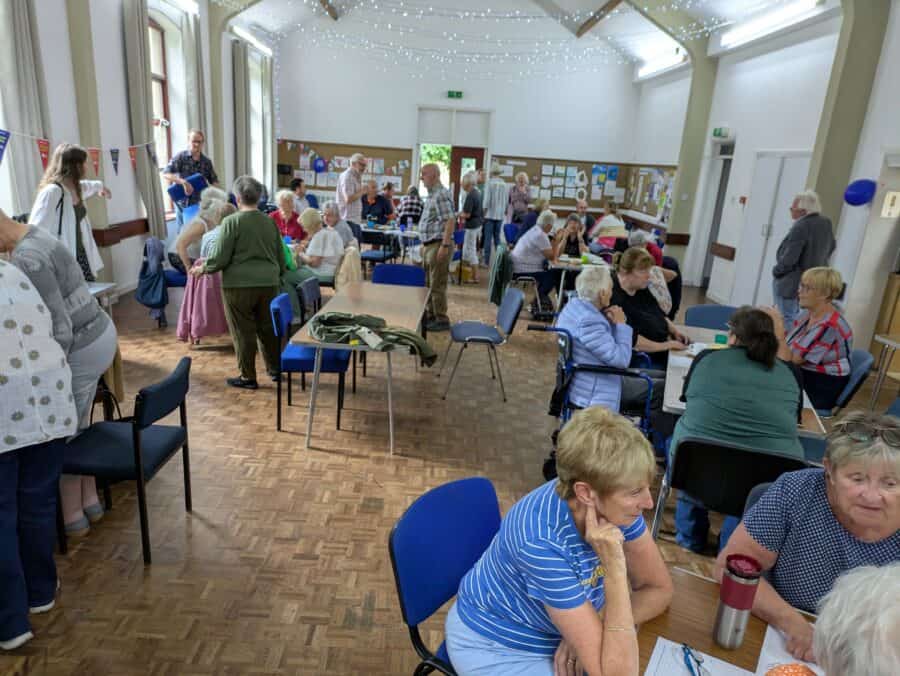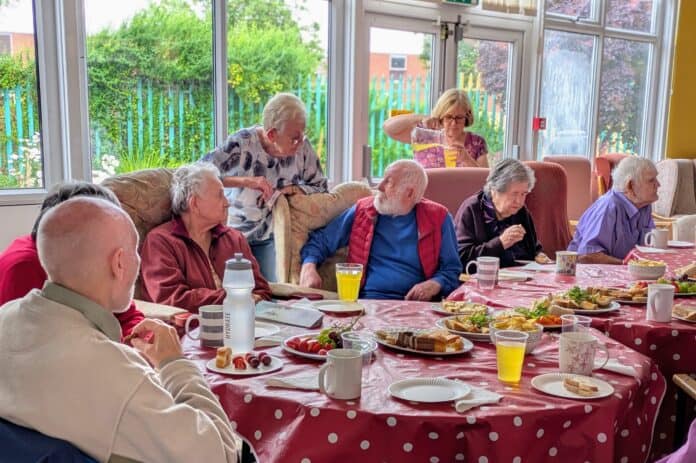By Noelle Williamson
The first memory café opened in the Netherlands in 1997, as “a place to just be. This way
the patient and their family don’t have to deny or avoid the illness.”
Now there are thousands, all over the world. Of course, in West Leeds, Bramley Elderly Action have been supporting older people since the nineties, and MHA (the Methodist Housing Association) has provided community services for people living with dementia for nearly 20 years.
Often, though, it has come down to one person – usually after years as the full-time carer
for their partner or parent – to drive the creation of the sort of safe social space they never
had.

After Peter Smith’s mother got her diagnosis, in 2002, their shared experience led Peter to
learn more about dementia; to educate people working in local shops, pubs and cafes in
Rothwell about dementia; and ultimately open the Tea Cosy Café, the first memory café in
Leeds. That was in 2011.
Since then, a most heartwarming chain has been forged in West Leeds: of pioneers like
Peter helping other would-be pioneers to start memory cafés in their own communities.
In 2016, Jean, a parishioner at Drighlington’s Methodist Church described how isolated she
and her late husband had felt during the decade she had nursed him through his illness.
She became part of the church’s response, as a founding member of The Coffee Pot memory café, which now attracts over 50 people every Friday, including the monthly lunch date.
Also in 2016, when parish councillors at Farsley’s St John the Evangelist determined to do
more to meet the needs of older parishioners, Lorna and Shirley reached out to Peter Smith
in Rothwell for guidance on setting up a memory café.
Peter, who by then was working for the Alzheimer’s Society, came through, and the Sunflower Café has now run for nine years.
Kim, a trainee lay minister at St Wilfrid’s, remembers: “My sister lives in Farsley and she
used to take Mum to Sunflower Café. Other than that, from the dementia point of view, we
were flying solo in Calverley.”
An active outgoing woman, Kim’s mum still needed an outlet for her personality and energy, to “just be”…herself, when dementia first entered her life.
“When Mum was going to Sunflower, her dementia wasn’t advanced, so she almost perceived that she was going to help.
“She would get some of ‘the old dears’ up singing and dancing, and things like that. So
that was the role that she adopted.”
Meanwhile, Kim’s sister could also “just be”, knowing that the Sunflower team knew what they were about: would allow her mum space to be herself, but not let her come to any harm.
“For some people, I think Sunflower is probably the only time they come out and feel safe
being out. Sometimes, it’s the carer that brings them, and they just want some respite. And even if that is only for 20 minutes, that’s fine.”
Kim felt strongly for a long time that Calverley needed its own memory café.
“But I just didn’t really know how. I knew I couldn’t do it on my own.”
She had to contain her frustration through Covid, Lockdown, the ‘return to normal life’ and her mum’s move to a care home, until, one morning in February 2024, she heard Rachael, parishioner and dementia researcher, talking with a curate about doing more for people living with dementia – and seized her moment.
She and Rachael met up to discuss what a memory café at St Wilfrid’s might look like. Rachael had specialist knowledge and Leeds connections.
Kim reached out to Lorna and Shirley, the leaders of the Sunflower Café, which her mother and sister had appreciated so much, and they helped her, just as Peter had helped them; and so did those “lovely, lovely people” at the Coffee Pot, in Drighlington.
Rob, the Vicar, offered the church itself as a venue, so that they would not have to budget, or compete, for a hired space.
“Café Revive was born. We felt strongly we didn’t want to call it a dementia cafe, because
it’s not about that.
“It’s about people who are living with memory issues, be they the person with memory issues or their carers or families or loved ones.
“We wanted it to be a safe place where people could gather. And we called it Café Revive because it’s a place to refuel, reflect, and remember.
“And this just feels right. This is the church. As a parish church, we have a responsibility for
people within the parish, whether they come to the church or not. I really believe that there was a gap in the market, so to speak, and we’ve been able to step into that gap.”
To anyone considering opening a memory café in their own community, be assured that you
don’t have to reinvent the wheel.
If you’re in Leeds, or any UK city, you can visit and observe, and reach out to the leaders, as Shirley, Lauren and Kim did, joining a link in your local chain.
All power to your elbow, and let us know all about it at West Leeds Dispatch!
It’s almost 30 years since Bère Meisen opened the first memory café in the Netherlands,
and 25 years since the first British memory café opened.
There are hundreds in the US and thousands across the world so, wherever you are, if there’s no memory café close enough to visit, you should at least be able to find others online.
The links in this series of articles, e.g. https://www.alzheimers.org.uk/ are all for UK organisations or the UK arm of international organisations. However, you can search by country on the Alzheimer’s Disease International website https://www.alzint.org/ and if you belong to a church, you’re already part of a network of community engagement and experience.

